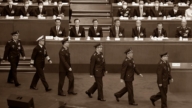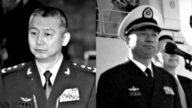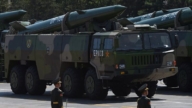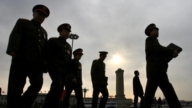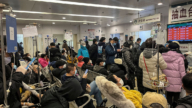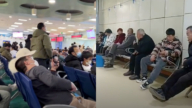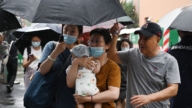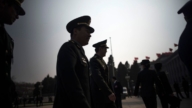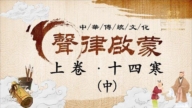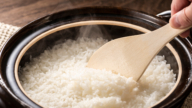【新唐人2012年11月08日讯】11月8号,中共召开十八大会议,将正式启动十年一次的权力交接,下一届常委将在所谓的差额选举中产生。英国媒体引述消息人士的话说,这次十名候选人中,将产生七名常委。外界普遍预期,习近平将出任国家主席,而国务院总理职务将由李克强接替。其他候选人谁上谁下,仍是未知数。评论分析,十八大名单出炉的最后一刻都会有一些玄机。
7号,《美国之音》报导说,中共中央政治局,现任九常委多数已接近或超过70岁。包括中共国家主席胡锦涛在内的七位常委,预计将交出党内职务,习近平将坐上头把交椅,李克强也将留任并高升。香港《亚洲周刊》10月26号列举最新军委名单,胡锦涛十八大后将连任军委主席。
而11月6号,《路透社》引述消息人士的话说,中共十八大政治局新常委选举,将是“十选七”,十名候选人中,除习近平、李克强外,还包括副总理王岐山、中宣部部长刘云山、中组部部长李源潮、重庆市委书记张德江、天津市委书记张高丽、广东省委书记汪洋、上海市委书记俞正声和国务委员刘延东。
近几个月来,外媒对中共十八大入常名单猜测不断,至今已传出多种版本,《路透社》公布的这十名入常候选人名单,基本都是之前被热炒的入常人选。
“中国民主党全委会美国委员会”主席张健认为,十八大名单出炉的最后一刻都会有一些玄机,这次会议有可能是中共最后的晚餐,希望能看到中国民主改革的呼声,从党内漫延到整个的社会,最后推翻中共专制体制。
“中国民主党全委会美国委员会”主席张健:“因为今年的十八大和往年所有召开的都不太相同,我们看到在中国风雨飘摇的政局面前,中共从来没有感到过自己的危险,来自国际方面的民主潮流,在对它进行围剿,来自于中国基层人民,对民主改革这个愿望越来越强烈,同时各地方,大规模的维权抗争事件不断的涌现,风起云涌,再加上它的高层人员的叛逃。”
中共十八大前,媒体传出中共政治局常委将在差额选举中产生,并且逐步制度化。常委的候选人名单将会保持20%以上的差额选举比例。说是为了进一步推进党内民主。实际上,这是在延续十七大时,政治局委员的产生方式。当时,中共在中央委员及政治局委员实行差额选举,差额比例是15%。
张健:“差额选举也就是说各派利益之间权衡这些东西,至于最终它的选票能否最后决定还不一定,在那种白热化,在用自己生命,用自己整个一个家族,一个利益链来去考量的时候,即便是差额选举达到我要求,我是满意的,如果你不达到我的要求,那可能我就拿你老底去报料,用各种方式,去把这个人搞臭搞垮,来达到他差额选举没达到的目地。”
时事评论员蓝述指出,中共的这种差额选举不是真正的民主。民主是人民当家做主,可是中共的整个差额选举过程中,人民既没有权利提名,也没有参与投票。
时事评论员蓝述:“它采用这种差额投票的方式可能有两个原因:一方面是中共现在所面临的社会矛盾和社会危机已经到了不可调和的地步,它必须要做出一些姿态出来,去缓解这个社会矛盾,做出一些民主的姿态﹔第二个可能性是,它不得不利用这种所谓的差额选举的方式走一个过场,这样也有利于缓解党内的各个集团之间的矛盾。”
蓝述指出,十八大后不管谁上台,只要在中国共产党的框架之内,搞所谓的改革也好,体制之内的民主也好,都不可能解决中国社会问题。解决的唯一方式就是解体中共。
采访编辑/李韵 后制/王明宇
Standing Committee Member list on 18th NPC
On 8th November, the Chinese Communist Party (CCP)
will hold its 18th National People’s Congress meeting (NPC),
and handover power, which happens every ten years.
Standing Committee members of the next session
will stand in so-called competitive elections.
British media quoted informants, saying that this will be
seven Standing Committee members from the ten candidates.
Outsiders widely expect, Xi Jinping to be appointed as
President, and the prime minister will be succeeded by Li Keqiang.
For the other candidates, who will be elected is still unknown.
Analysts say that the list will remain a secret until the last minute.
On 7th November, Voice of America reported that
the Political Bureau of the CCP Central Committee,
the nine Standing Committee members have
all been or are over the age of 70.
Seven of them, including President Hu Jintao
will hand over positions in the CCP.
Xi Jinping will become president, and Li Keqiang
will also be promoted.
Hong Kong’s Asia Week released a list citing the latest
Military Commission from 26th October,
with Hu Jintao being re-elected as military chairman.
On 6th November, Reuters quoted informants saying that
the Standing Committee of the Political Bureau of the CCP at the 18th NPC,
will be selected from ten candidates, including Xi Jinping,
Li Keqiang, Deputy Prime Minister Wang Qishan,
the Central Propaganda Department director Liu Yunshan,
the Central Organization Department Minister Li Yuanchao,
Chongqing CCP Secretary Zhang Dejiang,
Tianjin CCP Secretary Zhang Gaoli,
Guangdong CCP Secretary Wang Yang,
Shanghai CCP Secretary Yu Zhengsheng and State Councilor Liu Yandong.
In recent months, the foreign media have made
many guesses on the standing committee member list for the coming 18th NPC.
Many versions of the list were released.
Reuters announced the ten candidates list, which were
basically the candidates being discussed very often before.
Zhang Jian, Chairman of the United States Commission
of the China Democratic National Committee, believes that
there will be unknown factors until the last moment,
and this meeting will be the Last Supper for the CCP.
He hopes to see voices of democratic reform,
Spreading from the CCP to the whole society, and finally end the CCP regime.
Zhang Jian: “This year’s 18th NPC is different from those
in previous years, and we see China’s precarious political situation,
but the CCP has never felt in endangering themselves
from the democratic trend of the international community.
Grassroots people are also longing for democratic reform.
Large-scale human rights protests frequently appear
all over China, and also some CCP senior officials have defected to other countries.”
Before the 18th NPC, media reported that the Politburo
Standing Committee will be selected in a competitive election,
and will be gradually institutionalized. The Standing Committee
member list will keep 80% or less of the candidates on the list.
It was said to further promote democracy within the party.
But this is actually a continuation of the 17th NPC.
At that time, the CCP held selections for Central Committee
and Politburo members, with a 15% difference.
Zhang Jian: “Member selection is the trade-off between the
factions in their interests, but it cannot be decided outright.
It is fierce competition. They consider it from their own
life, their family, and their interest chain.
Although the selection aimed to satisfy requirements,
if you do not meet the requirement, your reputation can still be ruined.”
Political commentator Lan Shu pointed out that the CCP’s
selection is not a true democracy.
Democracy has the people as masters, but people have
neither the right to nominate or vote during the CCP’s entire selection process.
Lan Shu: “This differential voting may have two reasons.
One is that the CCP are facing irreconcilable social
contradictions and a social crisis,
so it must make some gestures to alleviate the
social conflicts, some gestures of democracy.
Secondly, it has to walk a cut scene with the differential
selection, which would also help to ease contradictions among different fractions.”
Lan Shu describes that after the 18th NPC, no matter who
is in power, as long as its within the framework of the CCP,
so-called reform or democracy within the system,
cannot resolve the social problems in China. The only way out is to disintegrate the CCP.


